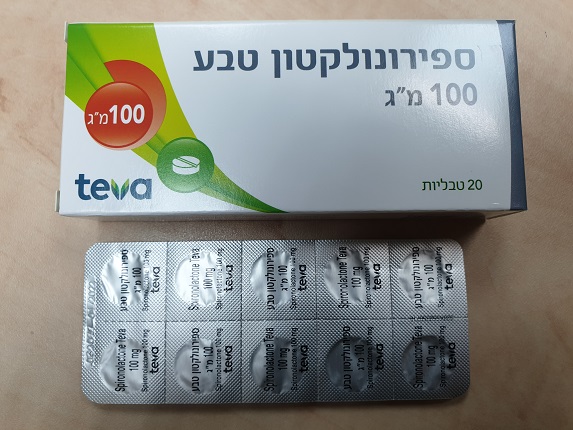Quest for the right Drug

ספירונולקטון טבע 100 מ"ג SPIRONOLACTONE TEVA 100 MG (SPIRONOLACTONE)
תרופה במרשם
תרופה בסל
נרקוטיקה
ציטוטוקסיקה
צורת מתן:
פומי : PER OS
צורת מינון:
טבליה : TABLETS
עלון לרופא
מינוניםPosology התוויות
Indications תופעות לוואי
Adverse reactions התוויות נגד
Contraindications אינטראקציות
Interactions מינון יתר
Overdose הריון/הנקה
Pregnancy & Lactation אוכלוסיות מיוחדות
Special populations תכונות פרמקולוגיות
Pharmacological properties מידע רוקחי
Pharmaceutical particulars אזהרת שימוש
Special Warning עלון לרופא
Physicians Leaflet
Special Warning : אזהרת שימוש
4.4 Special warnings and precautions for use Fluid and electrolyte balance Fluid and electrolyte status should be regularly monitored particularly in the elderly, in those with significant renal and hepatic impairment. Hyperkalaemia may occur in patients with impaired renal function or excessive potassium intake and can cause cardiac irregularities which may be fatal. Should hyperkalaemia develop Spironolactone Teva should be discontinued, and if necessary, active measures taken to reduce the serum potassium to normal (see section 4.3). Reversible hyperchloraemic metabolic acidosis, usually in association with hyperkalaemia has been reported to occur in some patients with decompensated hepatic cirrhosis, even in the presence of normal renal function. Concomitant use of Spironolactone Teva with other potassium-sparing diuretics, angiotensin- converting enzyme (ACE) inhibitors, nonsteroidal anti-inflammatory drugs, angiotensin II antagonists, aldosterone blockers, heparin, low molecular weight heparin or other drugs or conditions known to cause hyperkalaemia, potassium supplements, a diet rich in potassium or salt substitutes containing potassium, may lead to severe hyperkalaemia. Urea Reversible increases in blood urea have been reported in association with Spironolactone Teva therapy, particularly in the presence of impaired renal function. Hyperkalaemia in Patients with Severe Heart Failure Hyperkalaemia may be fatal. It is critical to monitor and manage serum potassium in patients with severe heart failure receiving spironolactone. Avoid using other potassium-sparing diuretics. Avoid using oral potassium supplements in patients with serum potassium >3.5 mEq/L. The recommended monitoring for potassium and creatinine is 1week after initiation or increase in dose of spironolactone, monthly for the first 3 months, then quarterly for a year, and then every 6 months. Discontinue or interrupt treatment for serum potassium >5 mEq/L or for serum creatinine >4 mg/dL (see section 4.2). Paediatric population Potassium-sparing diuretics should be used with caution in hypertensive paediatric patients with mild renal insufficiency because of the risk of hyperkalaemia. (Spironolactone is contraindicated for use in paediatric patients with moderate or severe renal impairment; see section 4.3).
Effects on Driving
4.7 Effects on ability to drive and use machines Somnolence and dizziness have been reported to occur in some patients. Caution is advised when driving or operating machinery until the response to initial treatment has been determined.

שימוש לפי פנקס קופ''ח כללית 1994
Hypertension, congestive heart failure, primary aldosteronism, nephrotic syndrome, premenstrual tension
תאריך הכללה מקורי בסל
01/01/1995
הגבלות
תרופה שאושרה לשימוש כללי בקופ'ח
מידע נוסף
